Corporate Social Responsibility: Policies, Impact & Analysis
VerifiedAdded on 2023/06/04
|10
|2554
|124
Essay
AI Summary
This essay provides a comprehensive overview of Corporate Social Responsibility (CSR) and its role in modern business organizations. It evaluates various aspects of CSR, including corporation tax and investment decisions, human rights, philanthropy, and the impact on environmental and sustainable development activities. The essay also discusses the evolution of CSR, its benefits, and the legal and ethical considerations involved. It highlights the importance of aligning CSR policies with environmental, social, and governance commitments to achieve sustainable development goals and strengthen communities. The analysis covers the role of philanthropy, environmental sustainability, and the importance of integrating human rights principles into corporate practices. The essay concludes that CSR is crucial for creating company value, maintaining employee relationships, and contributing to a sustainable future.
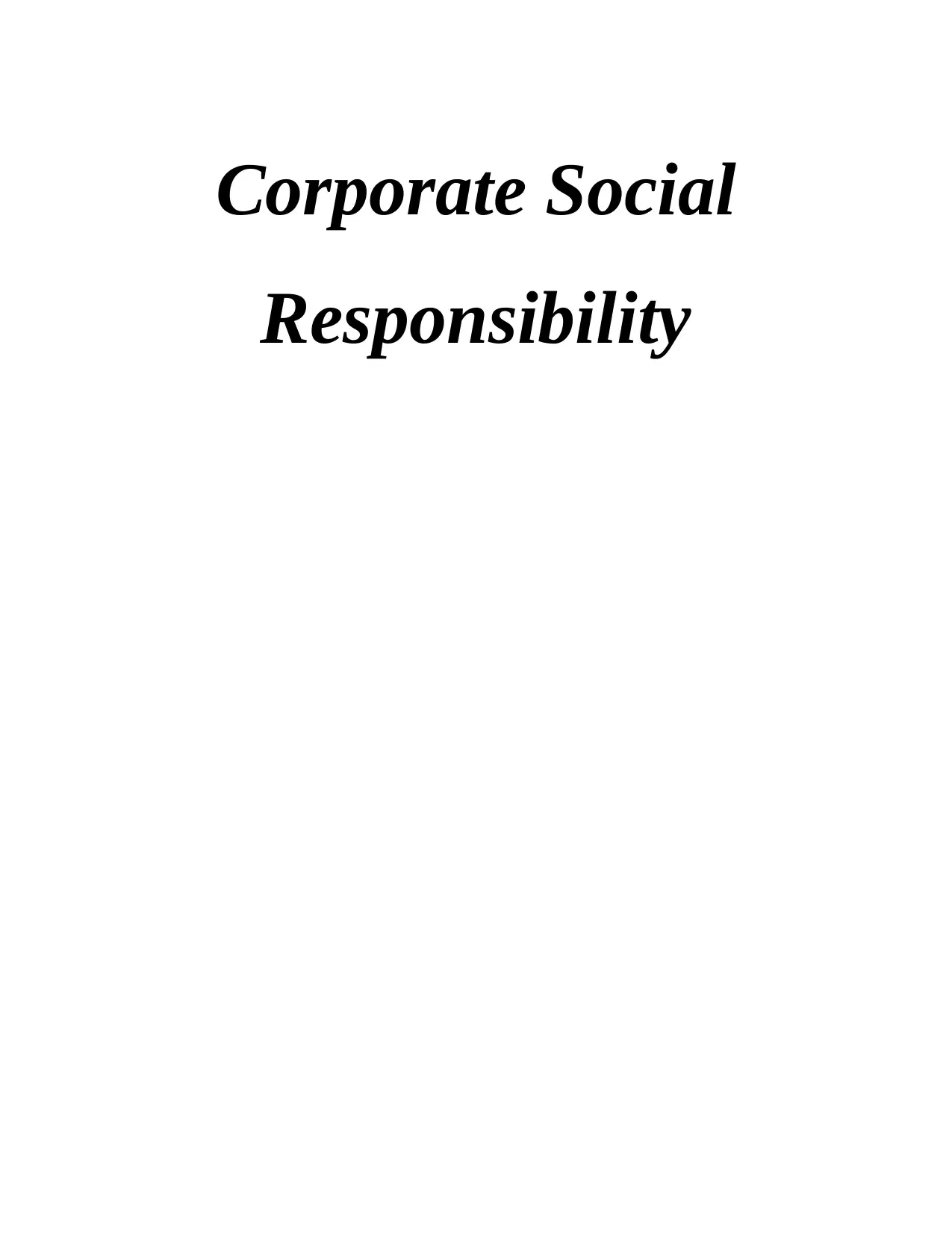
Corporate Social
Responsibility
Responsibility
Paraphrase This Document
Need a fresh take? Get an instant paraphrase of this document with our AI Paraphraser

Table of Contents
INTRODUCTION...........................................................................................................................3
MAIN BODY...................................................................................................................................4
CONCLUSION................................................................................................................................7
References:.......................................................................................................................................8
INTRODUCTION...........................................................................................................................3
MAIN BODY...................................................................................................................................4
CONCLUSION................................................................................................................................7
References:.......................................................................................................................................8

INTRODUCTION
The corporate social responsibility in a company is very important to deal with the social
causes. These company can easily build the brand value and build trust among their customers,
consumers, etc. The Corporate Social Responsibility helps a company in the long run. This
concept helps the corporation to do good. The CSR play a major role in different modern
business organisation. In this report, we also discuss about the various corporation tax and
investment practices and policies which are to be followed by different companies (Nave and
Ferreira, 2019). There are also many different rules and regulation which are to be discussed and
The corporate social responsibility in a company is very important to deal with the social
causes. These company can easily build the brand value and build trust among their customers,
consumers, etc. The Corporate Social Responsibility helps a company in the long run. This
concept helps the corporation to do good. The CSR play a major role in different modern
business organisation. In this report, we also discuss about the various corporation tax and
investment practices and policies which are to be followed by different companies (Nave and
Ferreira, 2019). There are also many different rules and regulation which are to be discussed and
⊘ This is a preview!⊘
Do you want full access?
Subscribe today to unlock all pages.

Trusted by 1+ million students worldwide
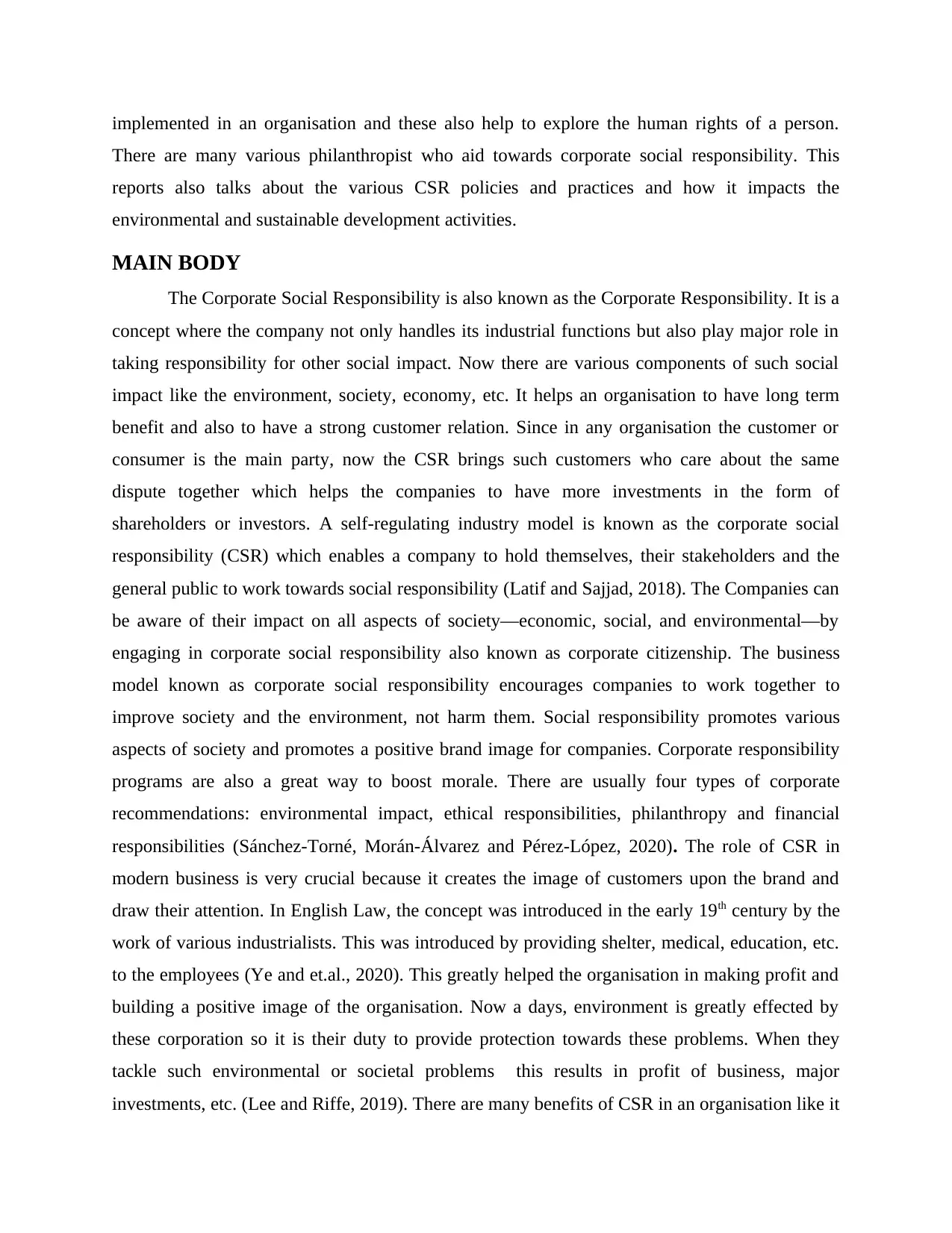
implemented in an organisation and these also help to explore the human rights of a person.
There are many various philanthropist who aid towards corporate social responsibility. This
reports also talks about the various CSR policies and practices and how it impacts the
environmental and sustainable development activities.
MAIN BODY
The Corporate Social Responsibility is also known as the Corporate Responsibility. It is a
concept where the company not only handles its industrial functions but also play major role in
taking responsibility for other social impact. Now there are various components of such social
impact like the environment, society, economy, etc. It helps an organisation to have long term
benefit and also to have a strong customer relation. Since in any organisation the customer or
consumer is the main party, now the CSR brings such customers who care about the same
dispute together which helps the companies to have more investments in the form of
shareholders or investors. A self-regulating industry model is known as the corporate social
responsibility (CSR) which enables a company to hold themselves, their stakeholders and the
general public to work towards social responsibility (Latif and Sajjad, 2018). The Companies can
be aware of their impact on all aspects of society—economic, social, and environmental—by
engaging in corporate social responsibility also known as corporate citizenship. The business
model known as corporate social responsibility encourages companies to work together to
improve society and the environment, not harm them. Social responsibility promotes various
aspects of society and promotes a positive brand image for companies. Corporate responsibility
programs are also a great way to boost morale. There are usually four types of corporate
recommendations: environmental impact, ethical responsibilities, philanthropy and financial
responsibilities (Sánchez-Torné, Morán-Álvarez and Pérez-López, 2020). The role of CSR in
modern business is very crucial because it creates the image of customers upon the brand and
draw their attention. In English Law, the concept was introduced in the early 19th century by the
work of various industrialists. This was introduced by providing shelter, medical, education, etc.
to the employees (Ye and et.al., 2020). This greatly helped the organisation in making profit and
building a positive image of the organisation. Now a days, environment is greatly effected by
these corporation so it is their duty to provide protection towards these problems. When they
tackle such environmental or societal problems this results in profit of business, major
investments, etc. (Lee and Riffe, 2019). There are many benefits of CSR in an organisation like it
There are many various philanthropist who aid towards corporate social responsibility. This
reports also talks about the various CSR policies and practices and how it impacts the
environmental and sustainable development activities.
MAIN BODY
The Corporate Social Responsibility is also known as the Corporate Responsibility. It is a
concept where the company not only handles its industrial functions but also play major role in
taking responsibility for other social impact. Now there are various components of such social
impact like the environment, society, economy, etc. It helps an organisation to have long term
benefit and also to have a strong customer relation. Since in any organisation the customer or
consumer is the main party, now the CSR brings such customers who care about the same
dispute together which helps the companies to have more investments in the form of
shareholders or investors. A self-regulating industry model is known as the corporate social
responsibility (CSR) which enables a company to hold themselves, their stakeholders and the
general public to work towards social responsibility (Latif and Sajjad, 2018). The Companies can
be aware of their impact on all aspects of society—economic, social, and environmental—by
engaging in corporate social responsibility also known as corporate citizenship. The business
model known as corporate social responsibility encourages companies to work together to
improve society and the environment, not harm them. Social responsibility promotes various
aspects of society and promotes a positive brand image for companies. Corporate responsibility
programs are also a great way to boost morale. There are usually four types of corporate
recommendations: environmental impact, ethical responsibilities, philanthropy and financial
responsibilities (Sánchez-Torné, Morán-Álvarez and Pérez-López, 2020). The role of CSR in
modern business is very crucial because it creates the image of customers upon the brand and
draw their attention. In English Law, the concept was introduced in the early 19th century by the
work of various industrialists. This was introduced by providing shelter, medical, education, etc.
to the employees (Ye and et.al., 2020). This greatly helped the organisation in making profit and
building a positive image of the organisation. Now a days, environment is greatly effected by
these corporation so it is their duty to provide protection towards these problems. When they
tackle such environmental or societal problems this results in profit of business, major
investments, etc. (Lee and Riffe, 2019). There are many benefits of CSR in an organisation like it
Paraphrase This Document
Need a fresh take? Get an instant paraphrase of this document with our AI Paraphraser
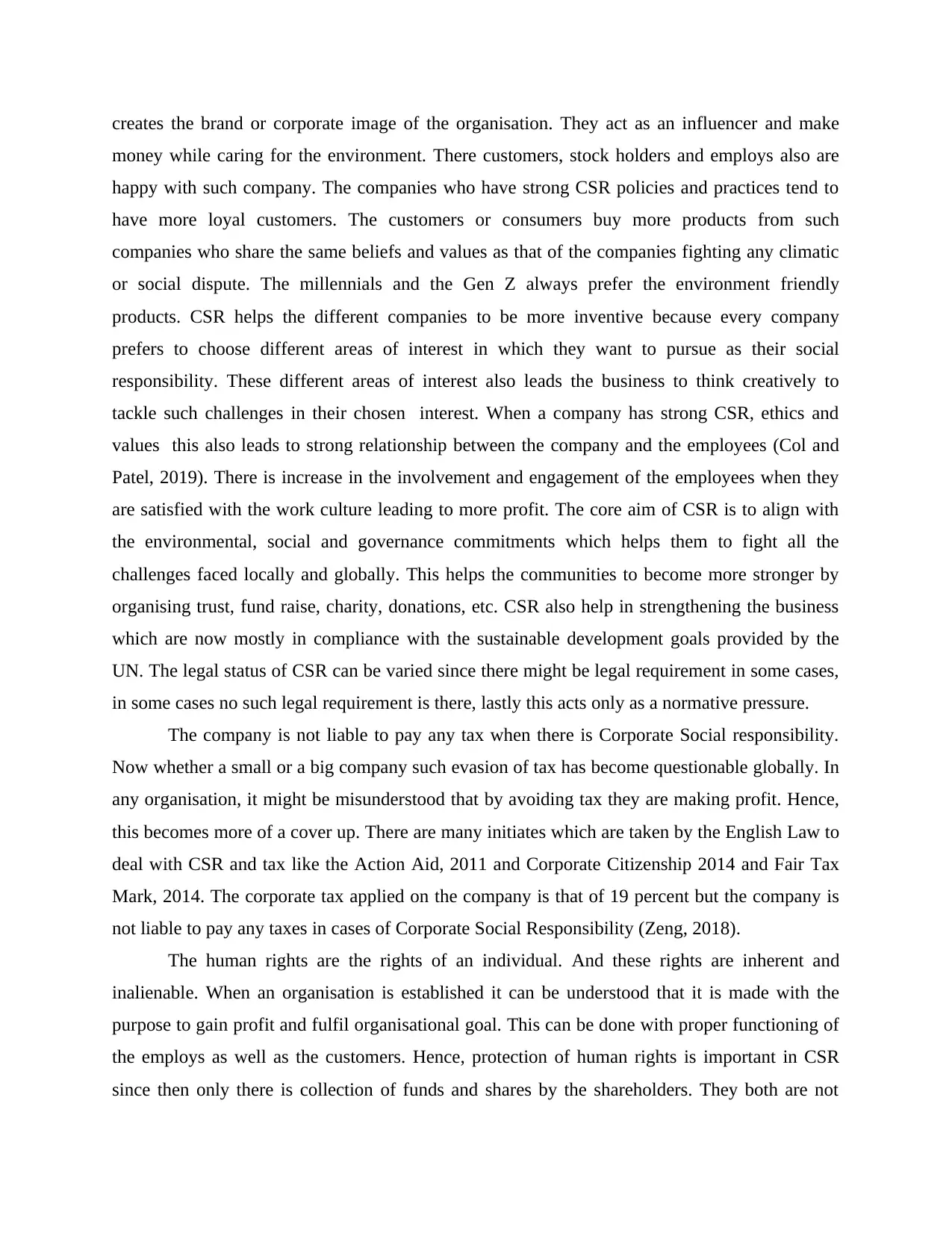
creates the brand or corporate image of the organisation. They act as an influencer and make
money while caring for the environment. There customers, stock holders and employs also are
happy with such company. The companies who have strong CSR policies and practices tend to
have more loyal customers. The customers or consumers buy more products from such
companies who share the same beliefs and values as that of the companies fighting any climatic
or social dispute. The millennials and the Gen Z always prefer the environment friendly
products. CSR helps the different companies to be more inventive because every company
prefers to choose different areas of interest in which they want to pursue as their social
responsibility. These different areas of interest also leads the business to think creatively to
tackle such challenges in their chosen interest. When a company has strong CSR, ethics and
values this also leads to strong relationship between the company and the employees (Col and
Patel, 2019). There is increase in the involvement and engagement of the employees when they
are satisfied with the work culture leading to more profit. The core aim of CSR is to align with
the environmental, social and governance commitments which helps them to fight all the
challenges faced locally and globally. This helps the communities to become more stronger by
organising trust, fund raise, charity, donations, etc. CSR also help in strengthening the business
which are now mostly in compliance with the sustainable development goals provided by the
UN. The legal status of CSR can be varied since there might be legal requirement in some cases,
in some cases no such legal requirement is there, lastly this acts only as a normative pressure.
The company is not liable to pay any tax when there is Corporate Social responsibility.
Now whether a small or a big company such evasion of tax has become questionable globally. In
any organisation, it might be misunderstood that by avoiding tax they are making profit. Hence,
this becomes more of a cover up. There are many initiates which are taken by the English Law to
deal with CSR and tax like the Action Aid, 2011 and Corporate Citizenship 2014 and Fair Tax
Mark, 2014. The corporate tax applied on the company is that of 19 percent but the company is
not liable to pay any taxes in cases of Corporate Social Responsibility (Zeng, 2018).
The human rights are the rights of an individual. And these rights are inherent and
inalienable. When an organisation is established it can be understood that it is made with the
purpose to gain profit and fulfil organisational goal. This can be done with proper functioning of
the employs as well as the customers. Hence, protection of human rights is important in CSR
since then only there is collection of funds and shares by the shareholders. They both are not
money while caring for the environment. There customers, stock holders and employs also are
happy with such company. The companies who have strong CSR policies and practices tend to
have more loyal customers. The customers or consumers buy more products from such
companies who share the same beliefs and values as that of the companies fighting any climatic
or social dispute. The millennials and the Gen Z always prefer the environment friendly
products. CSR helps the different companies to be more inventive because every company
prefers to choose different areas of interest in which they want to pursue as their social
responsibility. These different areas of interest also leads the business to think creatively to
tackle such challenges in their chosen interest. When a company has strong CSR, ethics and
values this also leads to strong relationship between the company and the employees (Col and
Patel, 2019). There is increase in the involvement and engagement of the employees when they
are satisfied with the work culture leading to more profit. The core aim of CSR is to align with
the environmental, social and governance commitments which helps them to fight all the
challenges faced locally and globally. This helps the communities to become more stronger by
organising trust, fund raise, charity, donations, etc. CSR also help in strengthening the business
which are now mostly in compliance with the sustainable development goals provided by the
UN. The legal status of CSR can be varied since there might be legal requirement in some cases,
in some cases no such legal requirement is there, lastly this acts only as a normative pressure.
The company is not liable to pay any tax when there is Corporate Social responsibility.
Now whether a small or a big company such evasion of tax has become questionable globally. In
any organisation, it might be misunderstood that by avoiding tax they are making profit. Hence,
this becomes more of a cover up. There are many initiates which are taken by the English Law to
deal with CSR and tax like the Action Aid, 2011 and Corporate Citizenship 2014 and Fair Tax
Mark, 2014. The corporate tax applied on the company is that of 19 percent but the company is
not liable to pay any taxes in cases of Corporate Social Responsibility (Zeng, 2018).
The human rights are the rights of an individual. And these rights are inherent and
inalienable. When an organisation is established it can be understood that it is made with the
purpose to gain profit and fulfil organisational goal. This can be done with proper functioning of
the employs as well as the customers. Hence, protection of human rights is important in CSR
since then only there is collection of funds and shares by the shareholders. They both are not
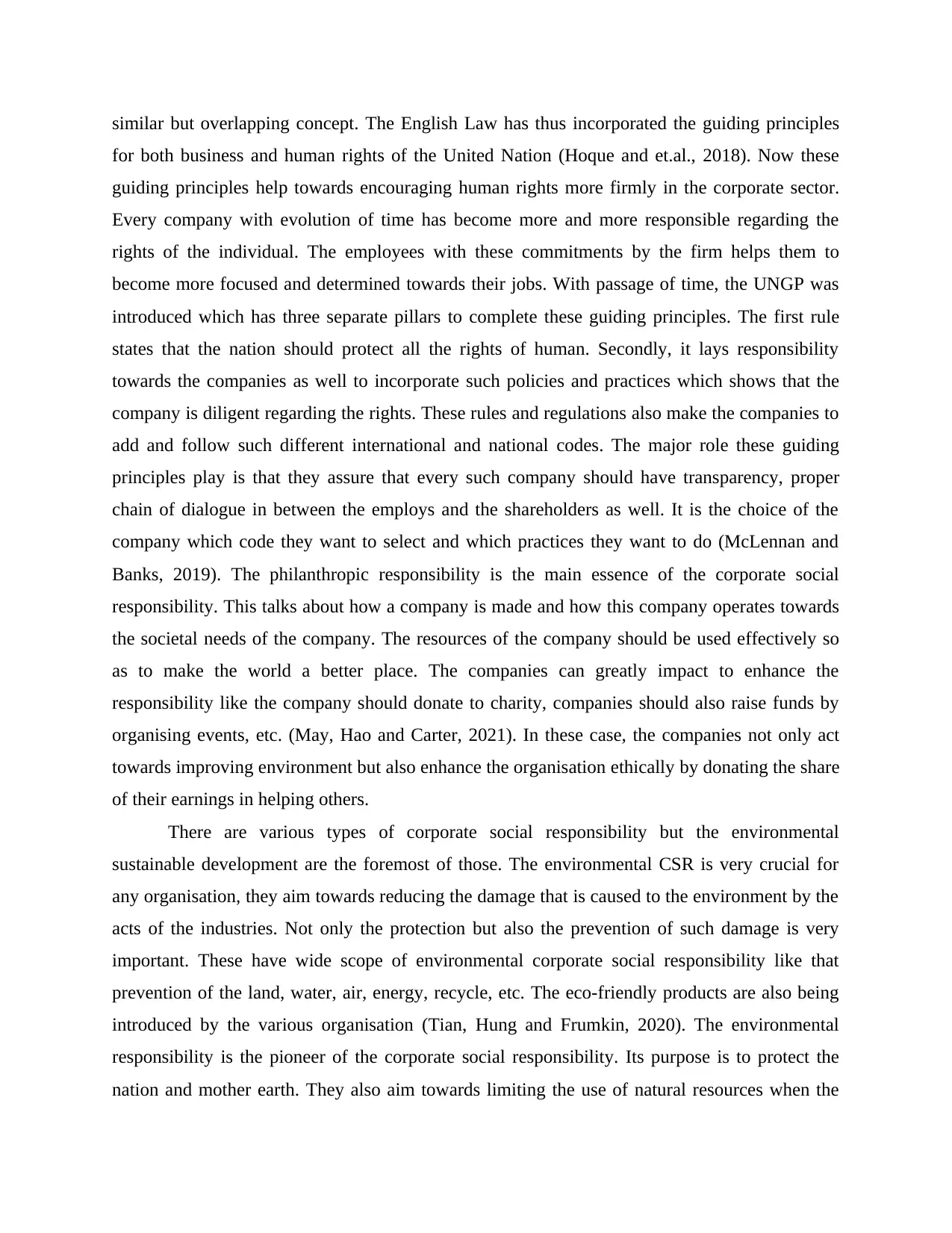
similar but overlapping concept. The English Law has thus incorporated the guiding principles
for both business and human rights of the United Nation (Hoque and et.al., 2018). Now these
guiding principles help towards encouraging human rights more firmly in the corporate sector.
Every company with evolution of time has become more and more responsible regarding the
rights of the individual. The employees with these commitments by the firm helps them to
become more focused and determined towards their jobs. With passage of time, the UNGP was
introduced which has three separate pillars to complete these guiding principles. The first rule
states that the nation should protect all the rights of human. Secondly, it lays responsibility
towards the companies as well to incorporate such policies and practices which shows that the
company is diligent regarding the rights. These rules and regulations also make the companies to
add and follow such different international and national codes. The major role these guiding
principles play is that they assure that every such company should have transparency, proper
chain of dialogue in between the employs and the shareholders as well. It is the choice of the
company which code they want to select and which practices they want to do (McLennan and
Banks, 2019). The philanthropic responsibility is the main essence of the corporate social
responsibility. This talks about how a company is made and how this company operates towards
the societal needs of the company. The resources of the company should be used effectively so
as to make the world a better place. The companies can greatly impact to enhance the
responsibility like the company should donate to charity, companies should also raise funds by
organising events, etc. (May, Hao and Carter, 2021). In these case, the companies not only act
towards improving environment but also enhance the organisation ethically by donating the share
of their earnings in helping others.
There are various types of corporate social responsibility but the environmental
sustainable development are the foremost of those. The environmental CSR is very crucial for
any organisation, they aim towards reducing the damage that is caused to the environment by the
acts of the industries. Not only the protection but also the prevention of such damage is very
important. These have wide scope of environmental corporate social responsibility like that
prevention of the land, water, air, energy, recycle, etc. The eco-friendly products are also being
introduced by the various organisation (Tian, Hung and Frumkin, 2020). The environmental
responsibility is the pioneer of the corporate social responsibility. Its purpose is to protect the
nation and mother earth. They also aim towards limiting the use of natural resources when the
for both business and human rights of the United Nation (Hoque and et.al., 2018). Now these
guiding principles help towards encouraging human rights more firmly in the corporate sector.
Every company with evolution of time has become more and more responsible regarding the
rights of the individual. The employees with these commitments by the firm helps them to
become more focused and determined towards their jobs. With passage of time, the UNGP was
introduced which has three separate pillars to complete these guiding principles. The first rule
states that the nation should protect all the rights of human. Secondly, it lays responsibility
towards the companies as well to incorporate such policies and practices which shows that the
company is diligent regarding the rights. These rules and regulations also make the companies to
add and follow such different international and national codes. The major role these guiding
principles play is that they assure that every such company should have transparency, proper
chain of dialogue in between the employs and the shareholders as well. It is the choice of the
company which code they want to select and which practices they want to do (McLennan and
Banks, 2019). The philanthropic responsibility is the main essence of the corporate social
responsibility. This talks about how a company is made and how this company operates towards
the societal needs of the company. The resources of the company should be used effectively so
as to make the world a better place. The companies can greatly impact to enhance the
responsibility like the company should donate to charity, companies should also raise funds by
organising events, etc. (May, Hao and Carter, 2021). In these case, the companies not only act
towards improving environment but also enhance the organisation ethically by donating the share
of their earnings in helping others.
There are various types of corporate social responsibility but the environmental
sustainable development are the foremost of those. The environmental CSR is very crucial for
any organisation, they aim towards reducing the damage that is caused to the environment by the
acts of the industries. Not only the protection but also the prevention of such damage is very
important. These have wide scope of environmental corporate social responsibility like that
prevention of the land, water, air, energy, recycle, etc. The eco-friendly products are also being
introduced by the various organisation (Tian, Hung and Frumkin, 2020). The environmental
responsibility is the pioneer of the corporate social responsibility. Its purpose is to protect the
nation and mother earth. They also aim towards limiting the use of natural resources when the
⊘ This is a preview!⊘
Do you want full access?
Subscribe today to unlock all pages.

Trusted by 1+ million students worldwide
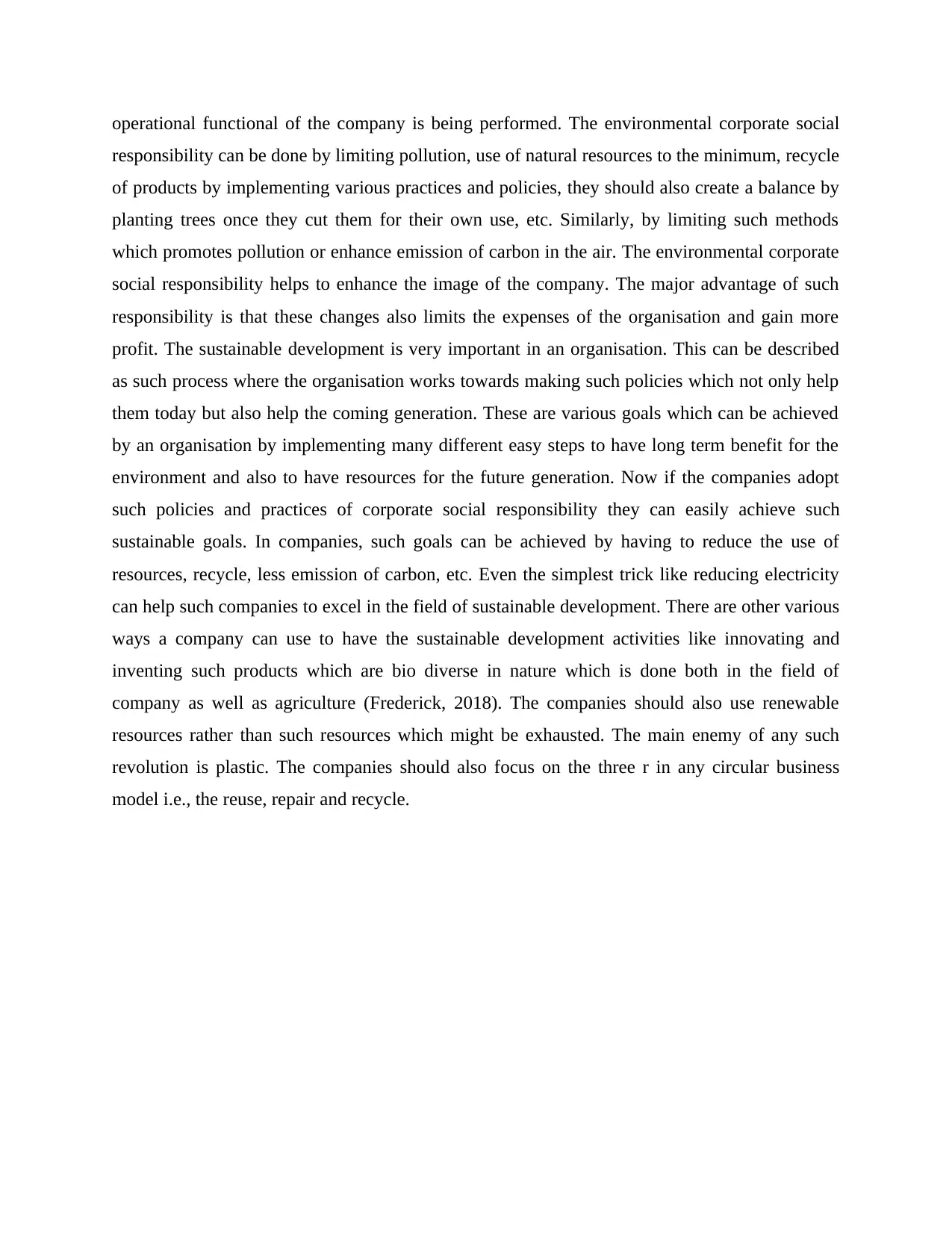
operational functional of the company is being performed. The environmental corporate social
responsibility can be done by limiting pollution, use of natural resources to the minimum, recycle
of products by implementing various practices and policies, they should also create a balance by
planting trees once they cut them for their own use, etc. Similarly, by limiting such methods
which promotes pollution or enhance emission of carbon in the air. The environmental corporate
social responsibility helps to enhance the image of the company. The major advantage of such
responsibility is that these changes also limits the expenses of the organisation and gain more
profit. The sustainable development is very important in an organisation. This can be described
as such process where the organisation works towards making such policies which not only help
them today but also help the coming generation. These are various goals which can be achieved
by an organisation by implementing many different easy steps to have long term benefit for the
environment and also to have resources for the future generation. Now if the companies adopt
such policies and practices of corporate social responsibility they can easily achieve such
sustainable goals. In companies, such goals can be achieved by having to reduce the use of
resources, recycle, less emission of carbon, etc. Even the simplest trick like reducing electricity
can help such companies to excel in the field of sustainable development. There are other various
ways a company can use to have the sustainable development activities like innovating and
inventing such products which are bio diverse in nature which is done both in the field of
company as well as agriculture (Frederick, 2018). The companies should also use renewable
resources rather than such resources which might be exhausted. The main enemy of any such
revolution is plastic. The companies should also focus on the three r in any circular business
model i.e., the reuse, repair and recycle.
responsibility can be done by limiting pollution, use of natural resources to the minimum, recycle
of products by implementing various practices and policies, they should also create a balance by
planting trees once they cut them for their own use, etc. Similarly, by limiting such methods
which promotes pollution or enhance emission of carbon in the air. The environmental corporate
social responsibility helps to enhance the image of the company. The major advantage of such
responsibility is that these changes also limits the expenses of the organisation and gain more
profit. The sustainable development is very important in an organisation. This can be described
as such process where the organisation works towards making such policies which not only help
them today but also help the coming generation. These are various goals which can be achieved
by an organisation by implementing many different easy steps to have long term benefit for the
environment and also to have resources for the future generation. Now if the companies adopt
such policies and practices of corporate social responsibility they can easily achieve such
sustainable goals. In companies, such goals can be achieved by having to reduce the use of
resources, recycle, less emission of carbon, etc. Even the simplest trick like reducing electricity
can help such companies to excel in the field of sustainable development. There are other various
ways a company can use to have the sustainable development activities like innovating and
inventing such products which are bio diverse in nature which is done both in the field of
company as well as agriculture (Frederick, 2018). The companies should also use renewable
resources rather than such resources which might be exhausted. The main enemy of any such
revolution is plastic. The companies should also focus on the three r in any circular business
model i.e., the reuse, repair and recycle.
Paraphrase This Document
Need a fresh take? Get an instant paraphrase of this document with our AI Paraphraser
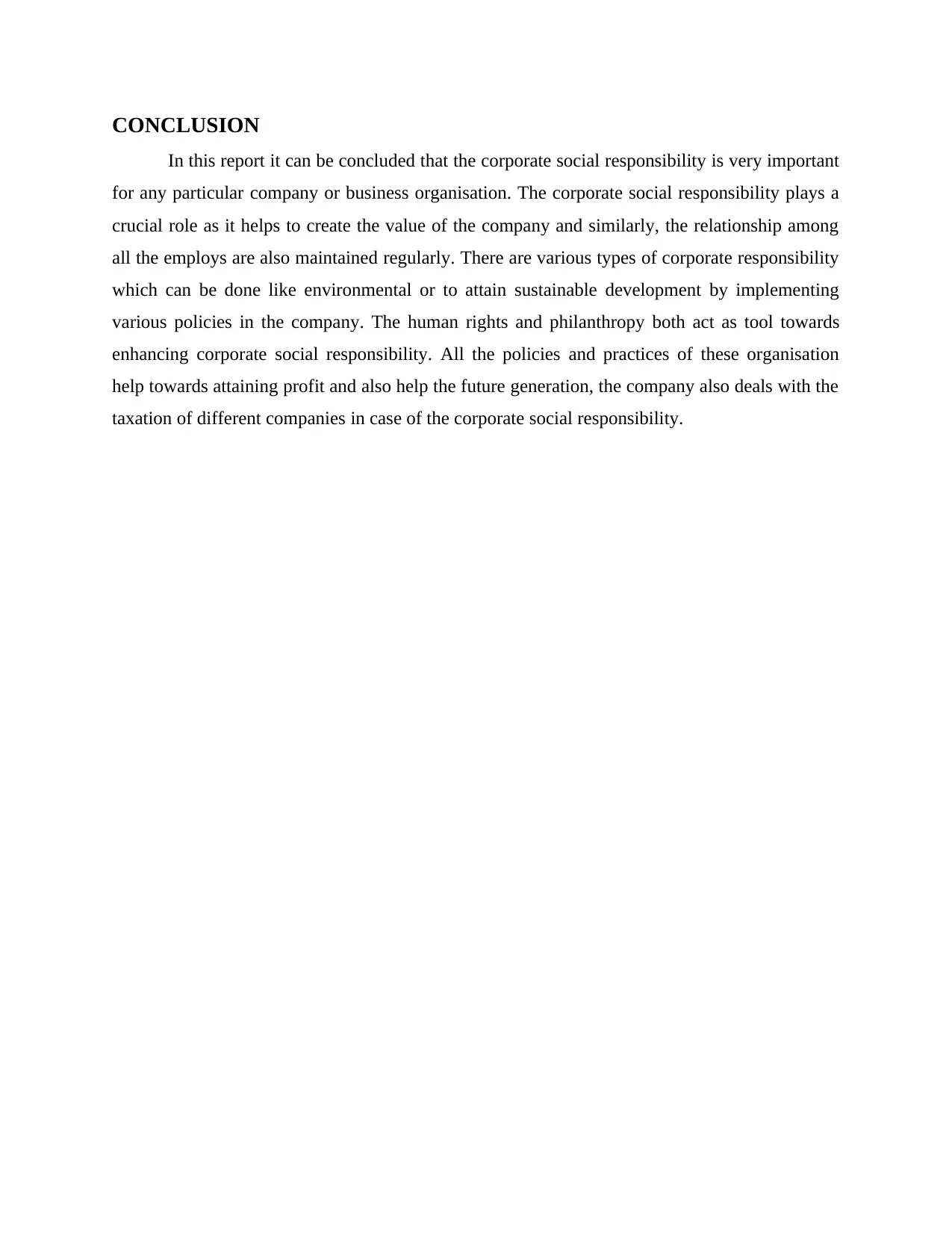
CONCLUSION
In this report it can be concluded that the corporate social responsibility is very important
for any particular company or business organisation. The corporate social responsibility plays a
crucial role as it helps to create the value of the company and similarly, the relationship among
all the employs are also maintained regularly. There are various types of corporate responsibility
which can be done like environmental or to attain sustainable development by implementing
various policies in the company. The human rights and philanthropy both act as tool towards
enhancing corporate social responsibility. All the policies and practices of these organisation
help towards attaining profit and also help the future generation, the company also deals with the
taxation of different companies in case of the corporate social responsibility.
In this report it can be concluded that the corporate social responsibility is very important
for any particular company or business organisation. The corporate social responsibility plays a
crucial role as it helps to create the value of the company and similarly, the relationship among
all the employs are also maintained regularly. There are various types of corporate responsibility
which can be done like environmental or to attain sustainable development by implementing
various policies in the company. The human rights and philanthropy both act as tool towards
enhancing corporate social responsibility. All the policies and practices of these organisation
help towards attaining profit and also help the future generation, the company also deals with the
taxation of different companies in case of the corporate social responsibility.
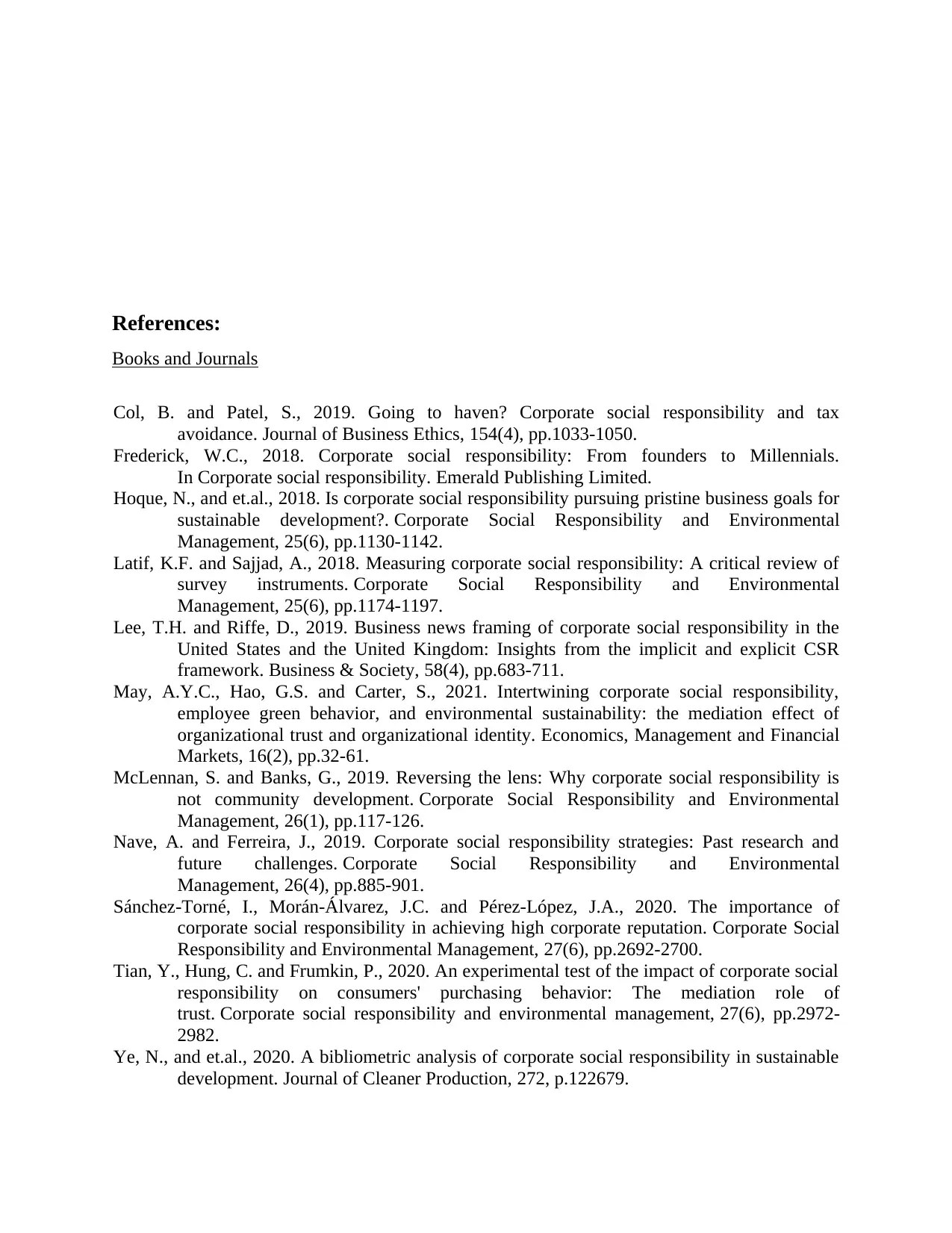
References:
Books and Journals
Col, B. and Patel, S., 2019. Going to haven? Corporate social responsibility and tax
avoidance. Journal of Business Ethics, 154(4), pp.1033-1050.
Frederick, W.C., 2018. Corporate social responsibility: From founders to Millennials.
In Corporate social responsibility. Emerald Publishing Limited.
Hoque, N., and et.al., 2018. Is corporate social responsibility pursuing pristine business goals for
sustainable development?. Corporate Social Responsibility and Environmental
Management, 25(6), pp.1130-1142.
Latif, K.F. and Sajjad, A., 2018. Measuring corporate social responsibility: A critical review of
survey instruments. Corporate Social Responsibility and Environmental
Management, 25(6), pp.1174-1197.
Lee, T.H. and Riffe, D., 2019. Business news framing of corporate social responsibility in the
United States and the United Kingdom: Insights from the implicit and explicit CSR
framework. Business & Society, 58(4), pp.683-711.
May, A.Y.C., Hao, G.S. and Carter, S., 2021. Intertwining corporate social responsibility,
employee green behavior, and environmental sustainability: the mediation effect of
organizational trust and organizational identity. Economics, Management and Financial
Markets, 16(2), pp.32-61.
McLennan, S. and Banks, G., 2019. Reversing the lens: Why corporate social responsibility is
not community development. Corporate Social Responsibility and Environmental
Management, 26(1), pp.117-126.
Nave, A. and Ferreira, J., 2019. Corporate social responsibility strategies: Past research and
future challenges. Corporate Social Responsibility and Environmental
Management, 26(4), pp.885-901.
Sánchez‐Torné, I., Morán‐Álvarez, J.C. and Pérez‐López, J.A., 2020. The importance of
corporate social responsibility in achieving high corporate reputation. Corporate Social
Responsibility and Environmental Management, 27(6), pp.2692-2700.
Tian, Y., Hung, C. and Frumkin, P., 2020. An experimental test of the impact of corporate social
responsibility on consumers' purchasing behavior: The mediation role of
trust. Corporate social responsibility and environmental management, 27(6), pp.2972-
2982.
Ye, N., and et.al., 2020. A bibliometric analysis of corporate social responsibility in sustainable
development. Journal of Cleaner Production, 272, p.122679.
Books and Journals
Col, B. and Patel, S., 2019. Going to haven? Corporate social responsibility and tax
avoidance. Journal of Business Ethics, 154(4), pp.1033-1050.
Frederick, W.C., 2018. Corporate social responsibility: From founders to Millennials.
In Corporate social responsibility. Emerald Publishing Limited.
Hoque, N., and et.al., 2018. Is corporate social responsibility pursuing pristine business goals for
sustainable development?. Corporate Social Responsibility and Environmental
Management, 25(6), pp.1130-1142.
Latif, K.F. and Sajjad, A., 2018. Measuring corporate social responsibility: A critical review of
survey instruments. Corporate Social Responsibility and Environmental
Management, 25(6), pp.1174-1197.
Lee, T.H. and Riffe, D., 2019. Business news framing of corporate social responsibility in the
United States and the United Kingdom: Insights from the implicit and explicit CSR
framework. Business & Society, 58(4), pp.683-711.
May, A.Y.C., Hao, G.S. and Carter, S., 2021. Intertwining corporate social responsibility,
employee green behavior, and environmental sustainability: the mediation effect of
organizational trust and organizational identity. Economics, Management and Financial
Markets, 16(2), pp.32-61.
McLennan, S. and Banks, G., 2019. Reversing the lens: Why corporate social responsibility is
not community development. Corporate Social Responsibility and Environmental
Management, 26(1), pp.117-126.
Nave, A. and Ferreira, J., 2019. Corporate social responsibility strategies: Past research and
future challenges. Corporate Social Responsibility and Environmental
Management, 26(4), pp.885-901.
Sánchez‐Torné, I., Morán‐Álvarez, J.C. and Pérez‐López, J.A., 2020. The importance of
corporate social responsibility in achieving high corporate reputation. Corporate Social
Responsibility and Environmental Management, 27(6), pp.2692-2700.
Tian, Y., Hung, C. and Frumkin, P., 2020. An experimental test of the impact of corporate social
responsibility on consumers' purchasing behavior: The mediation role of
trust. Corporate social responsibility and environmental management, 27(6), pp.2972-
2982.
Ye, N., and et.al., 2020. A bibliometric analysis of corporate social responsibility in sustainable
development. Journal of Cleaner Production, 272, p.122679.
⊘ This is a preview!⊘
Do you want full access?
Subscribe today to unlock all pages.

Trusted by 1+ million students worldwide

Zeng, T., 2018. Relationship between corporate social responsibility and tax avoidance:
international evidence. Social Responsibility Journal.
international evidence. Social Responsibility Journal.
1 out of 10
Related Documents
Your All-in-One AI-Powered Toolkit for Academic Success.
+13062052269
info@desklib.com
Available 24*7 on WhatsApp / Email
![[object Object]](/_next/static/media/star-bottom.7253800d.svg)
Unlock your academic potential
Copyright © 2020–2026 A2Z Services. All Rights Reserved. Developed and managed by ZUCOL.





